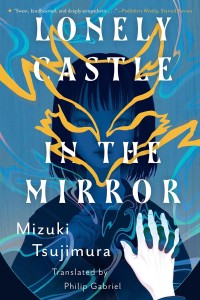
Childhood trauma. Check.
Split timeline. Check.
Transported to another world. Check.
Children competing for a prize (to the death?). Check.
This is Japan.
thoughts on the ending, beware of spoilers ¶
The last quarter of the book was a rollercoaster ride. Part of me would have liked some of the exposition and reveals that happen there to have been revealed more evenly throughout the book but I can’t deny that back loading it all made for a more powerful ending.
I think that labeling a book that features this many traumatic situations (serious bullying, attempted sexual violence, suicide, child cancer/death) as cozy is a farce. But I would say that the overall message is one of hope and connection with others.
Despite being rife with depictions of and references to traumatic events, the way it’s presented feels very real and earned. I hate “trauma porn” and this is not that thankfully.
The POV switches that happen at the end were a great way to show the reader that you never can truly know what other people have been through and so it’s important to be open minded and be kind to others. Everybody has an internal world that is as complex as your own, and you’ll never really be able to fully know 100% of someone else’s lived experience. So be kind!
Despite the troubling yet real themes, Lonely Castle in the Mirror is a fairy tale-esque story with a hopeful message.
No matter how isolated and lonely you are, there’s people who’ve been through what you’ve been through and will understand you. All you need to do is find these people and do everything you can to keep them in your life.
And, time is fleeting and life is short so it’s up to us to make the most of it while we’re here.
The book is not preachy but it presents these ideas in an organic and real way that feels earned.
I loved the book. Reading a book like this when I was a kid would have been really great.
Thoughts on the translation ¶
The translation is mostly good but there’s a few sentences that could have used some work.
“Ugly girls like you are the pits!”
Nobody uses the word “pits” like this anymore.
It was 29 March, the day before the farewell party.
It’s “March 29th” not “29 March”. I don’t care that we’re translating from Japanese, you wouldn’t be able to tell by the grammar/syntax alone if this was a perfect translation.
“It’s apple tea,” said Aki. “It’s also weird how the plates and cups I used were all washed up.”
This isn’t how the words “washed up” are meant to be used. Philip Gabriel repeats this wording 3 times in the next few sentences.
Generally, I’ve been disappointed with translations of Japanese works because it seems like Japanese is such a hard language to learn that it’s hard to find a translator who’s both fluent and a great writer. Ideally, translators should be better at writing than the authors of the texts they translate. Why? So they can write a text that both stands on its own and adapts the original faithfully while changing it enough to make it compelling for a new audience.
Philip Gabriel did a fine job here from what I can tell, but the text could have used another editing pass.